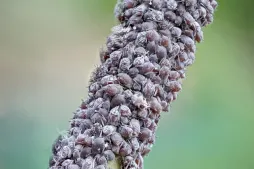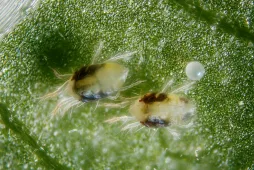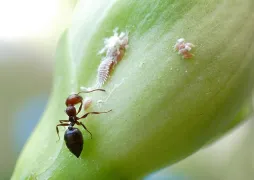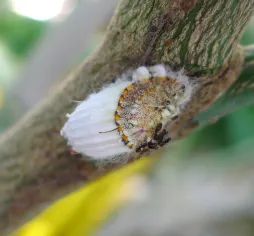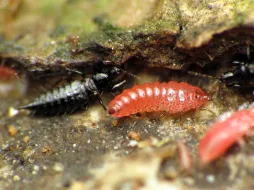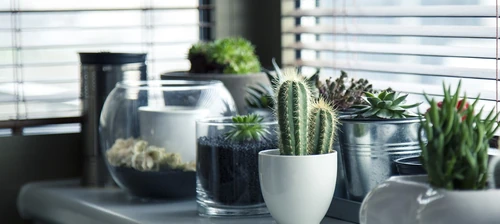Aglaonema crispum, a rare specimen
In its wild state, Aglaonema crispum grows in the Philippines. But this member of the Araceae family has left its native forests to enrich collectors' indoor jungles.
How to recognize Aglaonema crispum?
Aglaonema crispum is a bushy perennial. In the wild, this rhizomatous plant reaches a metre in height and a 30-centimetre spread.
Mature plants have thick stems. It measures up to three centimetres in diameter. It bears leaf scars, the remains of twigs that have already fallen off.
The leaf blades are attached to the stem by a long stalk (up to 25 cm long). Coriaceous, they measure up to 30 centimetres. Elliptical leaves have pointed apices. The olive-green midrib and margins contrast with the gray-green of the leaf blade.
Flowering occurs in midsummer. Green spathes hatch in the heart of the foliage. As the days go by, they turn yellow, then black.
Like aglaonema modestum and aglaonema simplex, this plant contains calcium oxalate crystals. The substance is toxic to humans and animals. It can cause skin irritation, burning of the mucous membranes and swelling of the tongue. Keep Aglaonema crispum out of the reach of dogs, cats and small children. Remember to wear gloves when pruning or repotting.
Our maintenance tips
Aglaonema crispum do not need much light to reveal the colors of their foliage. They are content with a spot in partial shade. Easy to live with, they require regular care, but are forgiving of oversights and mistakes.
Watering
Let the soil dry on the surface between two applications of water. Water your Aglaonema crispum with non-calcareous water, such as reclaimed rainwater. To avoid water stress, make sure the water is at room temperature.
If you use a saucer or planter, remove any water that stagnates at the bottom. It could rot the roots.
Spray
Aglaonema crispum appreciate a high degree of humidity. Fogging their foliage increases humidity and prevents the appearance of pests.
Spray with room-temperature water. Use non-calcareous water, such as rainwater, to avoid staining the leaves.
Repotting
In spring, transfer your Aglaonema crispum to a larger pot, so that it can continue to grow.
Aglaonema crispum like to be cramped. Re-pot in a pot one or two centimetres wider than the previous one. Choose a pierced plastic pot. This material retains moisture and is better suited to the plant's needs. Line the bottom with clay balls for drainage.
This variety thrives in rich soil. You can use potting soil for green plants and add compost or ground horn. Pour in a layer of substrate and place your subject in the center. Fill in with potting soil and tamp down.
Water to remove air bubbles and encourage rooting.
Fertilization
You can stimulate the development of your plant during its growth phase, in spring and summer, with fertilizer.
To promote growth and the appearance of new leaves, give your Aglaonema crispum green plant fertilizer.
Cleaning
Dust accumulating on the leaves slows down the photosynthesis process. To keep your Aglaonema crispum growing, clean the leaf blades with a damp sponge.
Remember that aglaonema crispum are toxic. Wear gloves or wash your hands after handling your plant.
Remember that aglaonema crispum are toxic. Wear gloves or wash your hands after handling your plant.
Prune
Your Aglaonema crispum does not need pruning. You can remove wilted leaves and cut back the flowering stem after flowering.
Remember that the plant is irritating. Use pruning shears or wear gloves during the operation.
Cutting
Cutting is carried out during the strong growth phase, generally in spring and early summer.
Carefully dig up the plant. Observe its root system and locate the individual plants. Separate them, always keeping a stem with its leaves and roots.
Division can be done by hand. But if the roots are too tangled, you can cut them with a clean, sharp tool.
In a pierced pot, pour gravel or clay balls for drainage. Add a rich substrate, such as special cuttings soil or horticultural compost. Dig a hole using a pen or stake. Plant your young Aglaonema crispum and tamp lightly.
Water to encourage rooting.
Water to encourage rooting.
Diseases / Threats
Information
| Family | Araceae - Araceae |
| Type | Aglaoneme - Aglaonema |
| Species | Aglaonema crispum - Aglaonema crispum |
| Lifecycle | Perennial |
| Foliage | Evergreen |
| Exposure | |
| Substrats | |
| Planting method |
In pots |
| Categories | |
| Tags |
Beginner Fritillary Toxic |
| Origin |
Southeast Asia |
| Hardiness (USDA) | 12a |
| Leaf color |
|
| Flower color |
|
Discover plants from the same family
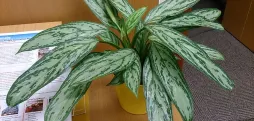
Aglaonema commutatum
Discover
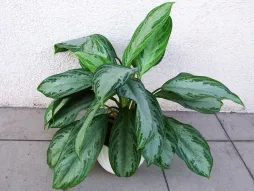
Aglaonema 'Silver Queen
Discover
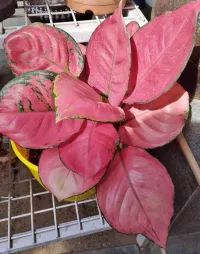
Aglaonema 'Pink Princess
Discover
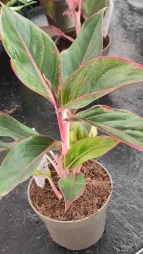
Aglaonema 'Crete
Discover













